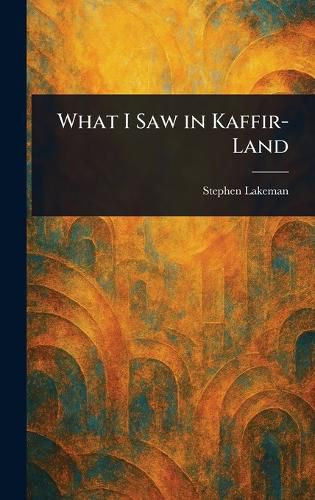Readings Newsletter
Become a Readings Member to make your shopping experience even easier.
Sign in or sign up for free!
You’re not far away from qualifying for FREE standard shipping within Australia
You’ve qualified for FREE standard shipping within Australia
The cart is loading…






This title is printed to order. This book may have been self-published. If so, we cannot guarantee the quality of the content. In the main most books will have gone through the editing process however some may not. We therefore suggest that you be aware of this before ordering this book. If in doubt check either the author or publisher’s details as we are unable to accept any returns unless they are faulty. Please contact us if you have any questions.
"What I Saw in Kaffir-Land" offers a firsthand account of South Africa's tumultuous Frontier Wars from 1811 to 1878. Written by Stephen Lakeman, this historical narrative provides valuable insights into the military and colonial history of the region. Delving into the conflicts that shaped "Kaffir-Land," the book presents a personal perspective on the events and challenges of the era.
Lakeman's observations offer a unique lens through which to understand the complexities of South Africa's past. Readers interested in African history, military campaigns, and personal narratives from the 19th century will find this work to be a compelling and informative resource. Explore the historical context of civil wars and gain a deeper understanding of South Africa's rich and often conflicted heritage through this meticulously prepared republication.
This work has been selected by scholars as being culturally important, and is part of the knowledge base of civilization as we know it.
This work is in the public domain in the United States of America, and possibly other nations. Within the United States, you may freely copy and distribute this work, as no entity (individual or corporate) has a copyright on the body of the work.
Scholars believe, and we concur, that this work is important enough to be preserved, reproduced, and made generally available to the public. We appreciate your support of the preservation process, and thank you for being an important part of keeping this knowledge alive and relevant.
$9.00 standard shipping within Australia
FREE standard shipping within Australia for orders over $100.00
Express & International shipping calculated at checkout
This title is printed to order. This book may have been self-published. If so, we cannot guarantee the quality of the content. In the main most books will have gone through the editing process however some may not. We therefore suggest that you be aware of this before ordering this book. If in doubt check either the author or publisher’s details as we are unable to accept any returns unless they are faulty. Please contact us if you have any questions.
"What I Saw in Kaffir-Land" offers a firsthand account of South Africa's tumultuous Frontier Wars from 1811 to 1878. Written by Stephen Lakeman, this historical narrative provides valuable insights into the military and colonial history of the region. Delving into the conflicts that shaped "Kaffir-Land," the book presents a personal perspective on the events and challenges of the era.
Lakeman's observations offer a unique lens through which to understand the complexities of South Africa's past. Readers interested in African history, military campaigns, and personal narratives from the 19th century will find this work to be a compelling and informative resource. Explore the historical context of civil wars and gain a deeper understanding of South Africa's rich and often conflicted heritage through this meticulously prepared republication.
This work has been selected by scholars as being culturally important, and is part of the knowledge base of civilization as we know it.
This work is in the public domain in the United States of America, and possibly other nations. Within the United States, you may freely copy and distribute this work, as no entity (individual or corporate) has a copyright on the body of the work.
Scholars believe, and we concur, that this work is important enough to be preserved, reproduced, and made generally available to the public. We appreciate your support of the preservation process, and thank you for being an important part of keeping this knowledge alive and relevant.